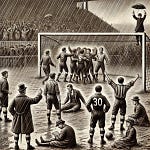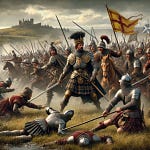Welcome back to "This Day in Scottish History." I'm your host, Colin MacDonald. Today, we remember a tragic and poignant event that forever changed the world of Scottish football. It was on September 5th, 1931, that Celtic goalkeeper John Thomson tragically died following an accidental collision during an Old Firm match against Rangers at Ibrox Park.
John Thomson was a talented young goalkeeper, born on January 28, 1909, in Kirkcaldy, Fife, to a mining family. Raised in the tight-knit community of Cardenden, Thomson's early life was marked by hard work and a passion for football. He began his career at a local club, Bowhill Rovers, in the Fife Junior Football League before moving to Wellesley Juniors. His talent was undeniable, and it wasn't long before he was noticed by Celtic. In 1926, at just 17 years old, he was signed by the club, quickly establishing himself as their first-choice goalkeeper.
Thomson was renowned for his exceptional agility, bravery, and safe handling—traits that endeared him to Celtic fans and earned him a reputation as one of the finest goalkeepers in the country. Standing at only 5 feet 9 inches, his stature was not what one might expect of a goalkeeper, but his athleticism and courage made him a formidable presence on the field. His teammates and football historians alike described him as "graceful," "athletic," and "courageous," with a unique ability to catch and hold even the fastest shots with grace and ease.
Tragically, Thomson's career and life were cut short during the infamous Old Firm derby on September 5, 1931. The match, played in front of a massive crowd of 80,000 at Ibrox Park in Glasgow, saw Thomson collide with Rangers forward Sam English while both players were going for the ball. Thomson's head struck English's knee, resulting in a fractured skull and a ruptured artery in his right temple. Though he was quickly stretchered off the field, the severity of his injuries was not immediately apparent to most spectators. Those who had witnessed the incident up close, however, feared the worst.
Thomson was rushed to the Victoria Infirmary in Glasgow, where he was treated for a severe depression in his skull. Despite emergency surgery to alleviate the pressure on his brain, Thomson succumbed to his injuries and was pronounced dead by 9:25 p.m. His death sent shockwaves through the football community and beyond, leaving a profound impact on fans, players, and officials alike.
The news of Thomson's death devastated his fiancée, Margaret Finlay, and left Sam English deeply traumatized. Although English was cleared of any wrongdoing in the incident, he was never able to fully escape the shadow of that tragic day, and his career was forever marked by the events at Ibrox. English eventually moved to Liverpool and continued to play, but he retired from football in 1938, describing his career after the accident as "seven years of joyless sport."
Thomson's funeral, held in his hometown of Cardenden, was attended by around 30,000 mourners, with many fans walking the 55 miles from Glasgow to pay their respects. His grave remains a site of pilgrimage for Celtic supporters to this day, a testament to his enduring legacy. The inscription on his gravestone reads, "They never die who live in the hearts they leave behind."
In the years since his passing, numerous tributes have been made to honor John Thomson's memory. A local committee, the John Thomson Memorial Committee, was established to ensure that his legacy continues to inspire future generations. The committee organizes annual events, including a children's football tournament in his honor, to perpetuate his name and achievements.
Thomson's story has been recounted in books, plays, and numerous articles, highlighting his exceptional talent and the tragedy that struck Scottish football. His impact on the sport, and the community of Celtic, remains profound even today. In 2008, following a campaign led by author Tom Greig, Thomson was posthumously inducted into the Scottish Football Hall of Fame, solidifying his place as one of Scotland's most beloved footballers.
As we remember John Thomson today, we honor not only his remarkable skill as a goalkeeper but also his spirit, courage, and the lasting mark he left on Scottish football. His story is a poignant reminder of the passion and dedication that define the beautiful game, and of the profound connections that football can forge between players, clubs, and their communities.
Thank you for joining us on this solemn journey through history. Join us tomorrow for another episode of "This Day in Scottish History." I'm Colin MacDonald, Haste Ye Back!













September 5th, 1931 - The Tragic Death of Footballer John Thomson